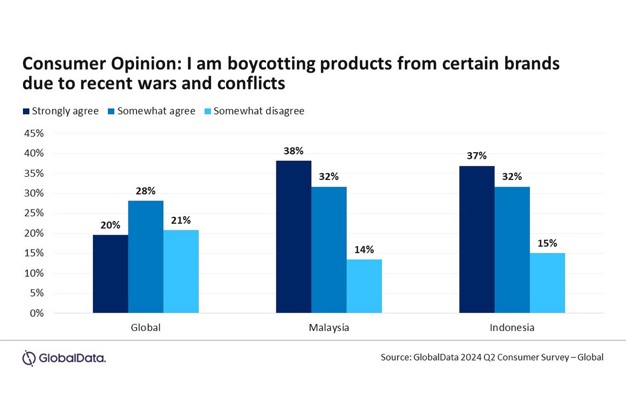Geopolitical tensions, such as the Israel–Hamas war, continue to pose a significant risk factor for brands. In the age of social media, brand boycotts over geopolitical tensions are becoming increasingly common. Moreover, Southeast consumers are more likely to boycott brands than consumers in most other markets, says GlobalData, a leading data and analytics company. Shravani Mali, Consumer Analyst at GlobalData, comments: "Several well-known brands have been negatively impacted by consumers boycotting companies they believe to be pro-Palestine or pro-Israel. This can be substantiated through a GlobalData Consumer Survey, wherein 48% of respondents across the globe strongly/somewhat agree that they are boycotting products from certain brands due to recent wars and conflicts*. However, this figure increases substantially to over two-thirds in Malaysia (70%) and Indonesia (69%)."
Shravani Mali, Consumer Analyst at GlobalData, comments: "Several well-known brands have been negatively impacted by consumers boycotting companies they believe to be pro-Palestine or pro-Israel. This can be substantiated through a GlobalData Consumer Survey, wherein 48% of respondents across the globe strongly/somewhat agree that they are boycotting products from certain brands due to recent wars and conflicts*. However, this figure increases substantially to over two-thirds in Malaysia (70%) and Indonesia (69%)."
Deepak Nautiyal, Consumer and Retail Commercial Director, APAC and Middle East at GlobalData, adds: "The ongoing war in Palestine holds significant implications for Western foodservice companies. For instance, earlier this year, Americana Restaurants International, a food and beverage company operating brands such as KFC, Pizza Hut, and Krispy Kreme with approximately 2,500 locations throughout the Middle East and North Africa, laid off about 100 employees and reported a 15% decline in revenue for the last quarter of 2023."
Mali continues: "Given the current situation, revenues of companies operating in the fast-food industry, such as McDonald's, Starbucks, Burger King, and Taco Bell have been impacted by the Israel–Hamas war. Starbucks reported a 2% decline in consolidated net revenues in Q2 2024. Furthermore, Western companies are facing boycotts in far-off Southeast Asian markets too. For instance, QSR Brands Holdings Bhd, the operator of KFC and Pizza Hut brands in Malaysia, temporarily suspended operations at over 100 KFC outlets due to the boycott of Western companies by pro-Palestine consumers."
Nautiyal concludes: "Boycotts change consumer behaviour, due to which brands face tough market conditions amid the evolving geopolitical landscape. Moreover, given the widespread penetration of social media, the impact of regional conflicts is spreading beyond the immediate neighbourhood, as evident from the boycotts in Malaysia. Companies must adapt to these situations by enhancing their risk management strategies to navigate the complexities."
For more information:
GlobalData
Tel: +91 40 6616 6809
[email protected]










